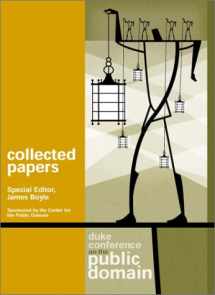
Collected Papers, Duke Conference on the Public Domain
ISBN-13:
9780974155302
ISBN-10:
0974155306
Author:
James Boyle
Publication date:
2003
Publisher:
Center for the Study of the Public Domain
Format:
Paperback
483 pages
FREE US shipping
Book details
ISBN-13:
9780974155302
ISBN-10:
0974155306
Author:
James Boyle
Publication date:
2003
Publisher:
Center for the Study of the Public Domain
Format:
Paperback
483 pages
Summary
Collected Papers, Duke Conference on the Public Domain (ISBN-13: 9780974155302 and ISBN-10: 0974155306), written by authors
James Boyle, was published by Center for the Study of the Public Domain in 2003.
With an overall rating of 3.6 stars, it's a notable title among other
books. You can easily purchase or rent Collected Papers, Duke Conference on the Public Domain (Paperback) from BooksRun,
along with many other new and used
books
and textbooks.
And, if you're looking to sell your copy, our current buyback offer is $0.58.
Description
The last fifteen years have seen a rise in both the importance and the strength of intellectual property rights in the world economy. Intellectual property law has expanded in scope – in areas ranging from the human genome to the Internet. Property rights have been lengthened, strengthened with legally backed digital fences, and protected with greater penalties. Is this expansion of intellectual property necessary to respond to new copying technologies, and desirable because it will produce investment and innovation? Must we privatize the public domain to avoid a "tragedy of the commons," or can the technologies of cheap copying and global networks actually make common pool management more efficient than legal monopolies? Questions such as these have thrown attention on the "other side" of intellectual property: the public domain. What does the public domain do? What is its importance, its history, its role in science, art, and in the building of the Internet? How is the public domain similar to and different from the idea of a commons? Is it constitutionally protected, or required by the norms of free expression? This symposium, the first to focus on the public domain, seeks to answer those questions. Its topics range across a broad swath of innovation and creativity, from science and the Internet to music and culture jamming. Its list of authors includes prominent environmental scholars, appropriation artists, legal theorists, historians and literary critics. The symposium is an edited version of the papers from a unique conference on the public domain at Duke University. Writing in the Financial Times, Patti Waldmeir described the event this way: "Professor Boyle brought together an elite group of intellectuals and scientists (and computer geeks) at Duke, hoping to launch a movement to protect the public domain. He argues that the inexorable advance of intellectual property law in recent years constitutes a ‘second enclosure movement’ to parallel the 18th-century enclosure of English common lands." In Technology Review magazine, Seth Shulman called the conference "an extraordinary meeting" and added: "In attendance were an eclectic array of actors from distinct intellectual-property battles…It was fascinating to see the sparks of commonality among this diverse group. Warning that greed and shortsightedness threaten to despoil innovation the way a previous frontier-minded generation despoiled the natural environment, a series of speakers urged the group to consider itself as an environmental movement for the new millennium – guarding collectively against the encroachment of proprietary intellectual-property rights." The focus of the symposium is particularly timely. The New York Times said of a recent Supreme Court decision that it made it "likely that we are seeing the beginning of the end of public domain and the birth of copyright perpetuity. Public domain has been a grand experiment, one that should not be allowed to die. The ability to draw freely on the entire creative output of humanity is one of the reasons we live in a time of such fruitful creative ferment." The articles assembled here are both an indispensable guide to this "grand experiment" and a fascinating contribution to the creative ferment it enables.


We would LOVE it if you could help us and other readers by reviewing the book
Book review

Congratulations! We have received your book review.
{user}
{createdAt}
by {truncated_author}


